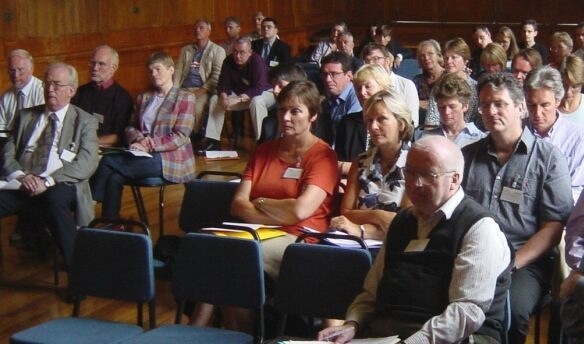My first LGA conference was great and I will be back next year. I learnt a lot, I made some great contacts who I will follow up with and political friendships which no doubt will last as long as we all remain in office.
I leave Birmingham with some fresh ideas and approaches, some existing thoughts better developed and some dots joined up in my head. But 2 thoughts dominate for me and they are essentially about how we operate and whether we are making best use of our human resources.
What sticks out first is the difference between constructive dialogue and just being talked at. When people share experiences, work through problems with peers and colleagues from a practical perspective you get better learning which means something and a deeper understanding of problems and solutions in the context they come from.
Unfortunately many of the sessions I attended were old skool set pieces with ‘expert’ speakers making presentations or giving speeches to an audience, followed by short time for Q&A (which invariably never get answered) It struck me as strange that with so much experience in one place, there were not more opportunities to sit down and discuss some of the challenges that we are practically dealing with – to share learning and experiences honestly and openly?
Secondly we have not bridged the Councillor / Officer divide but there are bright spots. LGA peer reviews are done by joint officer and Councillor teams, but also ensures it happens in the host authority. Many Councils are piloting joint problem solving approaches, or changing structures to bring Councillors and officers together but it’s a little hit and miss and people I spoke to acknowledged that where these did happen, good working relationships were generally already in place.
When the @lgchallenge finalists were asked to outline the content of their 1st briefing to the leader when they become Chief Executive, not one of them mentioned manifesto’s, political priorities or values. In an era of austerity, political choices are absolutely key. I didn’t get the sense talking to officers or other Councillors that we are making sure officers understand that they work in a political organisation and equally whether Councillors understand how their own organisation works to get better outcomes for their residents.
In saying all that I feel that the sector is in a healthy place, with bright young things and wise heads, innovation as well as ambition to face the most challenging circumstances ever. Sharing across the sector better in a meaningful way so necessary culture change is realised and contextual is vital going forward with innovation happening in so many places and at a pace that has been set so crushingly fast.
I’m interested by anyone who is doing anything new or old that brings together officers, partners and Councillors (maybe even residents!!!!) in a meaningful way, so please pass on anything you know or want to shout about.
Thanks



Jack, when I was on the other side of the fence I used to run a course called “How the Council Works” for middle tier officers. This was done jointly with a Member (usually Mahroof!) I may even have a copy of the presentation somewhere. BUT after we’d done the official how it works, we also talked about “How it really works” – where the group systems fit in, what the roles of group officers are, why the backbencher who is secretary of the controlling group is more powerful that officers think, having (small p) political antennae to know who is on the way up or down, knowing when Group AGMS are (often at a w/e) and whether the Leader will emerge intact and how if they don’t things will change even if the same group is in charge etc. Was always amazed at the questions asked – differerence between C Ex & Leader? – how some officers found it really boring & irrelevant (& we weren’t bad session runners!) And the number who’d say “I don’t envy you, having to work with councillors….”
In Lambeth when I was the Chief Whip we instituted a mandatory ‘Working in a Political Environment’ training course for those officers who have any sort of delegated authority which we are currently rolling out – I would do a session from a Councillors perspective, bit of myth busting as well as answering any questions (really trying to show that we are human beings)
It was surprising sometimes that officers didn’t even know what a Councillor was.
We also put in a ‘political nous’ clause in the constitution, so that if you were signing off a decision you had to assess whether there might be ‘p’olitical risk or PR potential damage and if so that you flag this higher up the chain.
Still not embedded though – should form a serious part of induction process, not just half hour speech by a politician but something deeper which helps understanding of what it means to work in public service and for the public purse.
Sounds very interesting (your formal and informal presentation) and something I’d be interested in learning more about. We’re in opposition here so it would be good to hear your thoughts on the subject from a non-administration perspective.
Will put something down on paper (maybe blog although that might be incredibly boring) Perhaps contained within a wider, how do you ensure the decisions which are made have the appropriate level of political accountability…